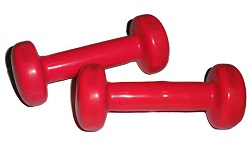
Exercise is #1 Factor for Healthy Lymphatic System
Most Neglected Body Mechanism
The lymphatic system is probably the most neglected system of the human body and a mechanism that is poorly understood by the average healthy person.
It is a vital network of vessels and nodes responsible for regulating fluids, distributing proteins and filtering out poisons in the fluid between the cells. The tonsils, thymus and spleen are all part of the lymphatic mechanism as well as the immune system. While the lymphatic system extends all over our entire body, there are regions where lymph nodes are concentrated and act as what I would call "collection debris centres". They are located in the subclavian (collarbone), the axillary (armpits) and in the inguinal (the crease where your thighs and abdomen meet) regions.
After lymph flushes through the system, sucking and collecting all of the pollutants, it flows through these regions to proper channels for metabolism or cleansing (liver) or filtering/excretion (kidneys). If an area of tissue gets infected, the lymph transports germs and tissue chemicals to the adjacent lymph nodes, which react by producing cells that are released into the circulation to fight the infection. When you have a sore throat and get swollen glands (lymph nodes) on the sides of your neck, this is a signal that the lymphatic system has been activated to fight the infection. When a cancer is present in the tissues, it can be transported to the lymph nodes. That's why doctors often check lymph nodes for the presence of cancer cells.

Importance of Exercise
The lymphatic system is not connected to the heart, so it has to depend on something else to create the necessary pumping action and maintain the flow. The three most important methods of lymphatic circulation are external massage, muscle expansion and contraction, and intense exercise. This means the more you move, the livelier it becomes. Exercises such as walking, cycling, using the stairs are ways to prevent stagnation of the inguinal nodes. Light weights, playing catch and swimming get the axillaries moving. And for our subclavian, tapping with the tips of the fingers gently tap just above and just below the collarbone and neck rotations. Exercise also makes us breathe more rapidly and deeply. Other than circulating more oxygen to the tissues, deep breathing also helps in the circulation of lymph fluid. Children breathe deeply from their diaphragm; however, as we advance in age, our breathing shifts to the chest and becomes faster and shallower. When we breathe in and out deeply, we are actually massaging the thoracic duct situated at the base of the neck upward into the neck so that the lymph fluid can flow generously.

Poor Lymph System Means Poor Health
Now, you see why the human body needs to move and why everyone needs to understand what this system does. It is a protector and a defence system against infection, viruses, bacteria, fungi, and disease. When the lymph is not overloaded, our health is maintained with nature's own detox design. But if the lymph is running sluggish and there is too much waste, a blockage in the lymphatic network happens, leading to symptoms like chronic fatigue, water retention, allergies, eczema and other skin conditions, infections, ear or balance problems, arthritis, headaches, stress, cellulite, excessive sweating, obesity, and etc. Lastly, also remember to drink plenty of fresh, clean water to keep yourself hydrated and help the kidneys flush out toxins, and of course, watch what you eat.